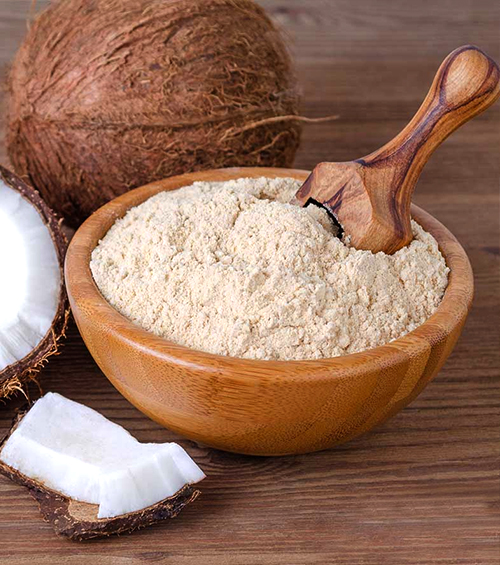- Coconut flour is a natural by-product of the manufactured coconut milk and is made from dried, powdered coconut meat.
- Coconut flour, like wheat flour, is a white or off-white flour that is widely used in baking. People on gluten-free diets can use coconut flour in baked goods instead of wheat flour because it doesn’t contain gluten.
- Coconut flour can be the best substitute for wheat flour. Coconut flour is thicker and holds more liquid than wheat flour and is gluten-free.
COCONUT FLOUR
What is coconut flour?
Nutritional Information
- Coconut flour provides more fat, protein, and fibre than wheat flour. As iron is the most abundant mineral in coconut flour, it’s a wonderful choice for vegans and vegetarians who are concerned about getting enough iron.
- The following ingredients are found in two teaspoons of coconut flour: 60% calories, 2 grams of protein, 2 grams of fat, 8 grams of carbohydrates, 5 grams of fibre, and 1 gram of sugar.
- Although many coconut products include significant levels of saturated fats, coconut flour is processed in such a way that these fats are removed, making it safe to consume on a regular basis
Potential Health Benefits of Coconut Flour
There are potential health benefits to using coconut flour instead of wheat flour. Coconut flour has a lower glycaemic index than wheat flour, which means the carbs in it take longer to digest and absorb. It also has more protein and fibre than wheat flour.
- Maintains a healthy blood sugar level. Using coconut flour instead of wheat flour in baked goods may help decrease blood sugar increases due to its lower glycaemic index rating.
- Gluten can be avoided. People with conditions that react well to a gluten-free diet may benefit from coconut flour. The autoimmune condition Celiac disease, which is driven by gluten, isn’t the only sickness that benefits from a gluten-free diet. Other autoimmune illnesses, such as Crohn’s disease and rheumatoid arthritis, can be avoided from a gluten-free diet.

- Easy to digest. Due to its high fibre content, coconut flour may aid digestion. It contains both soluble and insoluble fibre and has a higher fibre content than wheat flour. Fibre-rich foods aid digestion and stimulate the growth of beneficial bacteria in the gut. This aids in the regularity of bowel motions as well as the prevention of diseases.
- Reduce your weight. Dietary fibre, which is abundant in nature, has been shown to help people lose weight. Coconut flour’s high fibre content can help you feel fuller for longer, boost your energy, and curb your appetite.